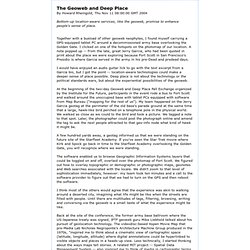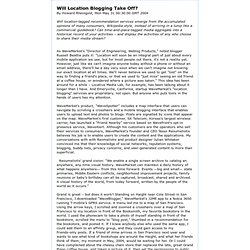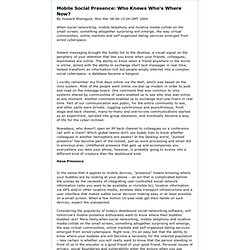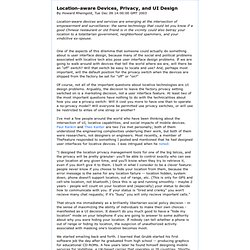

It's All About The Mobile Internet. The Geoweb and Deep Place By Howard Rheingold, Thu Nov 11 08:00:00 GMT 2004 Bottom-up location-aware services, like the geoweb, promise to enhance people's sense of place.

Together with a busload of other geoweb neophytes, I found myself carrying a GPS-equipped tablet PC around a decommissioned army base overlooking the Golden Gate. I clicked on one of the hotspots on the photomap of our location. A note popped up -- from the late, great Jerry Garcia, who had been quoted in print about the place we were exploring because Fort Scott in San Francisco's Presidio is where Garcia served in the army in his pre-Dead and predead days.
I would have enjoyed an audio guitar lick to go with the text excerpt from a Garcia bio, but I got the point -- location-aware technologies could make a deeper sense of place possible. A few hundred yards away, a geotag informed us that we were standing on the future site of the Starfleet Academy. It's All About The Mobile Internet. Will Location Blogging Take Off?

By Howard Rheingold, Mon May 31 00:30:00 GMT 2004 Will location-tagged recommendation services emerge from the accumulated opinions of many consumers, Wikipedia style, instead of arriving in a lump like a commercial guidebook? Can time-and-place-tagged media aggregate into a historical record of your activities – and display the activities of any who choose to share their media stream?
As WaveMarket's "Director of Engineering, Weblog Products," noted blogger Russell Beattie puts it: "Location will soon be an integral part of just about every mobile application we use, but for most people out there, it's not a reality yet. However, just like we can't imagine anyone today without a phone or without an email address, there'll be a day very soon when we can't imagine not knowing our exact location at all times.
Reoumeliotis' grand vision: “We enable a single screen archive to catalog an anywhere, any time visual history. Grand is great – but does it work? It's All About The Mobile Internet. Mobile Social Presence: Who Knows Who's Where Now?

By Howard Rheingold, Mon Mar 08 00:15:00 GMT 2004 When social networking, mobile telephony and locative media collide on the small screen, something altogether surprising will emerge, the way virtual communities, online markets and self-organized dating services emerged from wired cyberspace. Instant messaging brought the buddy list to the desktop, a visual signal on the periphery of your attention that lets you know when your friends, colleagues, teammates are online. The ability to know when a friend anywhere in the world is online, joined with the ability to exchange short text messages in real time, helped transform an information-rich but people-empty Internet into a complex social cyberspace: a database became a hangout.
I vividly remember my first days online via the Well, which was based on the Unix system. Nowadays, who doesn't open an IM back channel to colleagues on a conference call with a client? Have Presence. It's All About The Mobile Internet. Location-aware Devices, Privacy, and UI Design By Howard Rheingold, Tue Dec 09 14:00:00 GMT 2003 Location-aware devices and services are emerging at the intersection of empowerment and surveillance: the same technology that could let you know if a good Chinese restaurant or old friend is in the vicinity could also betray your location to a totalitarian government, neighborhood spammers, and your vindictive ex-spouse.

One of the aspects of this dilemma that someone could actually do something about is user interface design, because many of the social and political problems associated with locative tech also pose user interface design problems. If we are going to walk around with devices that tell the world where we are, will there be an "off" switch? Will that switch be easy to locate and use?
And, perhaps most important, will the default position for the privacy switch when the devices are shipped from the factory be set for "off" or "on? " We started emailing back and forth. 1) Friends.